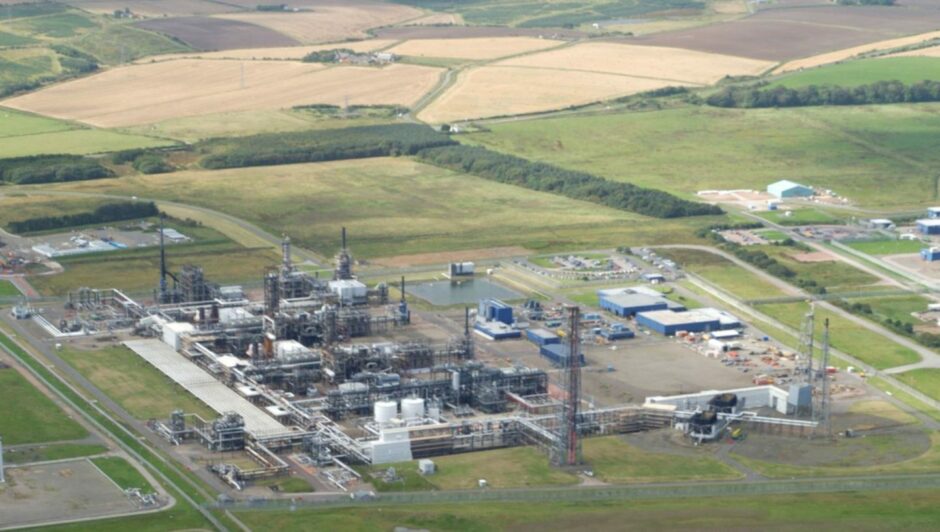
Chancellor Jeremy Hunt has confirmed a £20bn government support package for CCS, but developers of a flagship north east scheme must wait for further details.
Outlining his 2023 Spring Budget, the Chancellor said: “I am allocating up to £20bn of support for the early development of carbon, capture, usage and storage, starting with projects from our East Coast to Merseyside to North Wales.”
He said this would pave the way for CCS schemes “everywhere across the country” as the country approaches 2050.
However, it is at present unclear whether the north east’s Acorn scheme will be amongst those to receive backing.
Papers accompanying the budget note that a shortlist of eligible projects for the first phase of CCS deployment will be announced “later this month.”
Further capture projects will be able to enter a selection process for “Track 1 expansion” to be launched this year, and two additional clusters will be selected through a Track 2 process, with further details announced “shortly.”
The government said it would also introduce new legislation in a future Finance Bill to establish a new tax treatment for payments made into decommissioning funds by oil and gas companies in relation to the repurposing of oil and gas assets for use in CCUS projects.
The Budget confirms plans trailed last week.
Labelling the funding a “clean energy reset”, the Chancellor said the investment would help create up to 50,000 jobs and support the UK’s target to capture 20-30 million tonnes of emissions per year by 2030.
‘Turning point’
Further support for the CCS sector is sure to be welcomed, with some already calling the increased certainty a “defining moment” for the technology in the UK.
Ruth Herbert, chief executive at the CCS Association (CCSA), said: “We are delighted to see that the Chancellor has today confirmed £20 billion of funding for CCUS. This marks a turning point for this vital sector, delivering the much-needed certainty to investors that the UK is serious about delivering CCUS.”
“Today’s announcement means that two years since the launch of the programme, we can now move forward with implementing the initial CCUS clusters.”
Ms Herbert said the industry was also now overseeing “a healthy pipeline of projects”, with those in other regions now “eagerly awaiting their turn” to move forward.
“We look forward to seeing which projects have been chosen to move to construction, the forward timeline for selecting the next CCUS clusters that need to be operational this decade, and a swift passage of the Energy Bill through Parliament, to finalise the regulatory framework for the industry,” she added.
Viking awaits update
Cluster developers will keenly await further funding details, including the likes of Acorn and the Harbour Energy-backed Viking CCS scheme in South Humber.
Both Aberdeen and Grampian Chamber of Commerce (AGCC) and Harbour called for speed to enable them to progress to delivery.
Formerly named V Net Zero, Viking would capture regional emissions and move them offshore using the pre-existing 75-mile LOGGS pipeline, sequestering up to 10 million tonnes per year at the offshore Viking field.
Harbour – which is also involved in Acorn – was granted a CO2 appraisal and storage licence for the Viking area in 2021, and hopes to have the project operational from as early as 2027, assuming it proceeds with a final investment decision in 2024.
Harbour EVP HSES, Net Zero and CCS Steve Cox, said: “Today’s announcement from the Government is a welcome signal, recognising the significant role that CCS will play in reaching net zero.
“It’s important we now hear when the process for Track 2 cluster sequencing will take place. Viking CCS is well-positioned to transform the Humber and beyond, with the capacity to store 10 mtpa by 2030 – a third of the Government’s target.
“In doing so, it will create low carbon industry opportunities, protect, and create tens of thousands of jobs, and unlock billions of pounds of private sector inward investment.”
Acorn ‘must benefit’ from funding
However, with plans for north-east CCS scheme now having been on the table for almost two decades, yet more waiting was not what many backers may have had in mind.
Responding to the Chancellor’s Spring statement, Ryan Crighton, policy director at AGCC said: “We welcome the £20bn funding for the development of carbon capture projects – and the Acorn Project on the Buchan coast must be one of the beneficiaries of this additional investment if we are to transform our region into the net zero capital of Europe.”
Banff and Buchan MP David Duguid, a longtime advocate of the Scottish Cluster, said the scheme was in “a good place” ahead of an update on its Track 2 status.
“This announcement shows that the UK Government’s commitment to CCUS remains strong and they are fully aware of the need to accelerate the Scottish Cluster,” he said.
“I have and will continue to ensure Acorn receives the recognition and support it needs, while pushing for clarity on the timeline and process that will be followed for Track 2 which I’m told will be announced shortly.”
He said progress on the cluster was “particularly crucial” in enabling the expansion of the nearby Peterhead power station.
Mr Crighton also affirmed Aberdeen should be “first in the queue” for a position as part of the Scottish Investment Zone proposed by the Chancellor as part of the budget.
“This region has proven time and time again that it can work with government and academia to tackle the big challenges facing the UK,” Mr Crighton said.
BEIS Committee chairman Darren Jones also urged the Chancellor for further information on many of the energy and business policies unveiled in the Budget, and called for publication of a long-awaited Industrial Strategy.
While he too welcomed the CCS commitments, he noted that “it’s not clear how that commitment is being funded.
“We understand there will be further energy related announcements on Net Zero later this month and we will consider the detail of those announcements then, alongside our current inquiry into decarbonisation of the power sector.”
He also said his committee was “concerned” that a “fragmented approach” to regional economic growth was worsening with the addition of investment zones on top of existing enterprise areas, enterprise zones, city deals, power houses and freeports.
 © Supplied by Shell
© Supplied by Shell